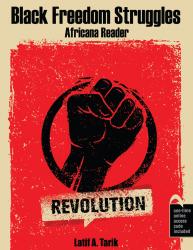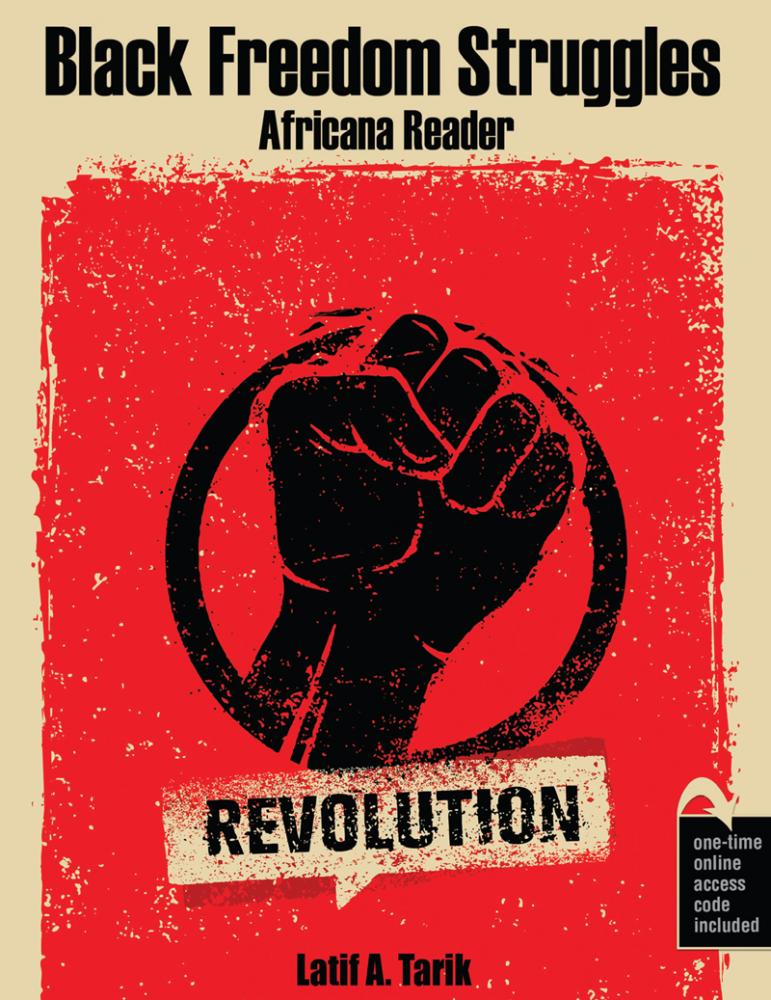Black Freedom Struggles: Africana Reader
Author(s): Latif A. Tarik
Edition: 1
Copyright: 2021
Choose Your Platform | Help Me Choose
Black Freedom Struggles: Africana Reader examines the histories of African and African-descended people’s struggles for freedom around the world. The eBook format features a combination of primary and secondary sources. Students will explore and examine the nature of various Africana freedom struggles from the colonial era to the present. Black Freedom Struggles is written to serve as a primary text for undergraduates in Africana Studies courses. The framework of Black Freedom Struggles uses a thematic format starting in the period of African enslavement to the modern era. The authors of the text are college professors and experts in their fields of Africana History and subjects related to Interdisciplinary Studies.
Section I: Origins of Black Freedom Struggles
“Mexico City’s Black Conspiracy in 1612: Slavery and Racial Politics in New Spain”
The All-Black Town Movement for Self-Determination
Revolutions at the Randolph House
Panoramic Cartography of the Afro Descendants in Latin America and the Hispanic Caribbean
Section II: African American Radicalism in the Twentieth and Twenty-First Century
Heaven-Makers: Women in the Nation of Islam as Mothers and Beyond
Dancing Protest: (Re)Visiting The Black Arts Movement
Mumia Abu-Jamal and the History of His Voice, 1969–2021
Audley Moore and the Modern Reparations Movement
Black Religion and The Origins of Black Liberation Theology
Assata Shakur: A True Revolutionary
Section III: Radical Global Perspectives
Travel Notes: Pan-Africanism (Re)Visited From Sankofa to Afrofuturism – Summary of the “2nd Kwame Nkrumah Pan-African Intellectual & Cultural Festival” (Essay 1)
Travel Notes: Pan-Africanism (Re)Visited From Sankofa to Afrofuturism –Summary of the “2nd Kwame Nkrumah Pan-African Intellectual & Cultural Festival” (Essay 2)
An Intellectual Portrait of Cheikh Anta Diop: “The Pharaoh of the Nile
The Struggle for Governance-Democracy in Contemporary Africa
Section IV: Global Movements
St. Clair Drake: Towards a Sociology of the Black Diaspora
Networks of Steel: How Reparations for the European Enslavement of Africans Unites the African Diaspora
Interlocking Faith, Popular Culture, and Islamic Consciousness in Hip Hop Culture (Essay 1)
Interlocking Faith, Popular Culture, and Islamic Consciousness in Hip Hop Culture (Essay 2)
Section V: Historical Personalities
Hattie McDaniel: Revisioning Her Importance to Black History
‘To Help America Be a Real Democracy and Make Democracy a Reality in Mississippi’: Fannie Lou Hamer and the Black Freedom Struggle
Julius Nyerere, Nnamdi Azikiwe, and Chinua Achebe: A Quest for African Leadership
Marcus Garvey and Du Bois-Opposing Views (An Excerpt from the Book Entitled Garvey and Du Bois-A Race to Nowhere: A Feud to Change All Time)
Introduction: Warrior/Queen Dr. Frances Cress Welsing, A Legacy of Intellectual Brilliance and Perfect Love
Section VI: Teaching Africana Studies Within the Humanities
Using Maps in Studying the African Diaspora: Culture, Routes, and Roots
A Persistent Denial On Archival Erasure and Network Analysis Interventions
Research Methods, Library Science, and Databases for Africana Studies
Pop Culture in the English Composition Classroom: How a Classic Episode of Sanford & Son Has Helped My Students Connect with Alice Walker
Glossary
Appendices
Appendix I Africana Writing Topics
Appendix II Map of Pre-colonial African Kingdoms
Appendix III The African Diaspora Map—I
Appendix IV CIA Map of Africa
Appendix V Contributors’ Biographies
Latif A. Tarik graduated from Howard University and holds a Doctor of Philosophy in African Diaspora History. He works as an assistant professor of history and history program coordinator at Elizabeth City State University. Tarik is the book review editor for the Southern Conference on African American Studies, INC, The Griot Journal of African American Studies. His publications include journal articles, book chapters, and digital humanities. His academic research interests are radical protest movements, African Diaspora communities, history and popular culture, public history, and African centered scholarship. Tarik’s publications as a contributing writer are Race and Ethnicity in America: From Pre-contact to the Present ( Volumes 1-4), African Religions: Beliefs and Practices through History, Islam and the Black Experience African American history reconsidered, Africology: The Journal of Pan African Studies, “Travel Notes: Pan Africanism (Re)Visited: From Sankofa to Afrofuturism—Summary of the 2nd Kwame Nkrumah Pan-African Intellectual & Cultural Festival” and chief editor of Black Freedom Struggles: Africana Reader.
Black Freedom Struggles: Africana Reader examines the histories of African and African-descended people’s struggles for freedom around the world. The eBook format features a combination of primary and secondary sources. Students will explore and examine the nature of various Africana freedom struggles from the colonial era to the present. Black Freedom Struggles is written to serve as a primary text for undergraduates in Africana Studies courses. The framework of Black Freedom Struggles uses a thematic format starting in the period of African enslavement to the modern era. The authors of the text are college professors and experts in their fields of Africana History and subjects related to Interdisciplinary Studies.
Section I: Origins of Black Freedom Struggles
“Mexico City’s Black Conspiracy in 1612: Slavery and Racial Politics in New Spain”
The All-Black Town Movement for Self-Determination
Revolutions at the Randolph House
Panoramic Cartography of the Afro Descendants in Latin America and the Hispanic Caribbean
Section II: African American Radicalism in the Twentieth and Twenty-First Century
Heaven-Makers: Women in the Nation of Islam as Mothers and Beyond
Dancing Protest: (Re)Visiting The Black Arts Movement
Mumia Abu-Jamal and the History of His Voice, 1969–2021
Audley Moore and the Modern Reparations Movement
Black Religion and The Origins of Black Liberation Theology
Assata Shakur: A True Revolutionary
Section III: Radical Global Perspectives
Travel Notes: Pan-Africanism (Re)Visited From Sankofa to Afrofuturism – Summary of the “2nd Kwame Nkrumah Pan-African Intellectual & Cultural Festival” (Essay 1)
Travel Notes: Pan-Africanism (Re)Visited From Sankofa to Afrofuturism –Summary of the “2nd Kwame Nkrumah Pan-African Intellectual & Cultural Festival” (Essay 2)
An Intellectual Portrait of Cheikh Anta Diop: “The Pharaoh of the Nile
The Struggle for Governance-Democracy in Contemporary Africa
Section IV: Global Movements
St. Clair Drake: Towards a Sociology of the Black Diaspora
Networks of Steel: How Reparations for the European Enslavement of Africans Unites the African Diaspora
Interlocking Faith, Popular Culture, and Islamic Consciousness in Hip Hop Culture (Essay 1)
Interlocking Faith, Popular Culture, and Islamic Consciousness in Hip Hop Culture (Essay 2)
Section V: Historical Personalities
Hattie McDaniel: Revisioning Her Importance to Black History
‘To Help America Be a Real Democracy and Make Democracy a Reality in Mississippi’: Fannie Lou Hamer and the Black Freedom Struggle
Julius Nyerere, Nnamdi Azikiwe, and Chinua Achebe: A Quest for African Leadership
Marcus Garvey and Du Bois-Opposing Views (An Excerpt from the Book Entitled Garvey and Du Bois-A Race to Nowhere: A Feud to Change All Time)
Introduction: Warrior/Queen Dr. Frances Cress Welsing, A Legacy of Intellectual Brilliance and Perfect Love
Section VI: Teaching Africana Studies Within the Humanities
Using Maps in Studying the African Diaspora: Culture, Routes, and Roots
A Persistent Denial On Archival Erasure and Network Analysis Interventions
Research Methods, Library Science, and Databases for Africana Studies
Pop Culture in the English Composition Classroom: How a Classic Episode of Sanford & Son Has Helped My Students Connect with Alice Walker
Glossary
Appendices
Appendix I Africana Writing Topics
Appendix II Map of Pre-colonial African Kingdoms
Appendix III The African Diaspora Map—I
Appendix IV CIA Map of Africa
Appendix V Contributors’ Biographies
Latif A. Tarik graduated from Howard University and holds a Doctor of Philosophy in African Diaspora History. He works as an assistant professor of history and history program coordinator at Elizabeth City State University. Tarik is the book review editor for the Southern Conference on African American Studies, INC, The Griot Journal of African American Studies. His publications include journal articles, book chapters, and digital humanities. His academic research interests are radical protest movements, African Diaspora communities, history and popular culture, public history, and African centered scholarship. Tarik’s publications as a contributing writer are Race and Ethnicity in America: From Pre-contact to the Present ( Volumes 1-4), African Religions: Beliefs and Practices through History, Islam and the Black Experience African American history reconsidered, Africology: The Journal of Pan African Studies, “Travel Notes: Pan Africanism (Re)Visited: From Sankofa to Afrofuturism—Summary of the 2nd Kwame Nkrumah Pan-African Intellectual & Cultural Festival” and chief editor of Black Freedom Struggles: Africana Reader.



